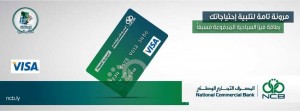By Sami Zaptia.

London, 18 March 2016:
The Audit Bureau has published a ‘’sample’’ list of the top 77 Libyan individuals who it . . .[restrict]claims had corruptly obtained debit card facilities of over LD 70,000 each on their National Commercial Bank (NCB) Visa debit cards.
The top offender, named as Raif R.S. Rihab was able to top up his debit card 95 times between 2014-2015 at the time when the NCB had stopped topping up debit cards as a result of instructions by the Central Bank of Libya (CBL). Rihab was able to top up his prepaid debit card to a staggering total of LD 1,135,000.
The maximum annual top up limit on prepaid debit cards was LD 15,000 in 2014-15. It has since been reduced to LD 4,500.
All 77 named were from three Tripoli branches of the NCB: Dahra, Souk il Thlat and the Tripoli main branch. The 77 people were able to gain LD 16,097,486 worth of top ups on their cards, giving them an average of LD 209,000 each. That translates to the share of 3,577 other Libyans at the 2016 maximum of LD 4,500.
The Visa debit card enables Libyans to pay into their debit cards in Libya, in Libyan dinars, and either pay for goods or services abroad, or withdraw cash in hard currency abroad. Some corrupt Libyans, and their corrupt and conspiring bank employees, are then able to repatriate the hard currency in cash into Libya and sell it on the black market at around 266 percent profit.
This inequitable distribution of hard currency deprives other Libyan citizens of their rights as full Libyan citizens of their fair share of Libya’s oil wealth in the form of hard currency and therefore their right as Libyan citizens to pay for their private medical treatment abroad, or private education abroad, to travel abroad or to the right to import goods from abroad – within their annual allowance.
It must be kept in mind, and as the Audit Bureau has stated, the list published by the Audit Bureau was only a sample list cutting off at the LD 70,000 point. This suggests that the grand total is much greater. The revealed list also only applies to the NCB and does not include the rest of the banks operating in Libya. [/restrict]






